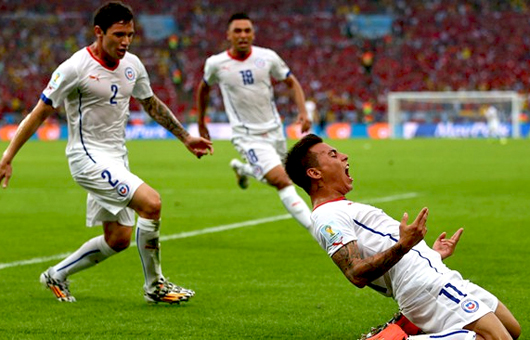
Jun 28: In his first interview after last December’s Final Draw for the FIFA World Cup™, Brazil coach Luiz Felipe Scolari told TV Globo that the one team he wanted to avoid in the Round of 16 was Chile – not South Africa 2010 Finalists Spain and the Netherlands, but Chile.
“I’d prefer any other side,” said Felipão at the time. “They’re an awkward team to play. They’re organised and their system doesn’t fit in with ours. They’re intelligent and a good side.”
There were many who felt Scolari was playing mind games, though few people are thinking that way now, not with the gritty Chileans having emerged from a tough section to tee up a last-16 meeting with the hosts on Saturday. “When I spoke about them a while ago people laughed at me,” commented Scolari. “Now everyone thinks they’re fantastic.”
Coming from the coach of the host nation, a man who already has one World Cup title on his CV, those words are an indication of the high regard in which the Chileans are held in world football today. Though far from favourites going into the game, Jorge Sampaoli’s enterprising, combative side merit the utmost respect, having now proved themselves to the world with a style of play that remains the same no matter who is facing them.
Their next opposition are the team that have knocked Chile out every time they have progressed beyond the group phase, Brazil proving their nemesis in the semi-finals in 1962 – a tournament the Chileans hosted – and in the Round of 16 in 1998 and 2010.
“One thing I can absolutely guarantee is that we’re going to play a fast game, regardless of the opposition,” said Sampaoli. “Every match is different, but our attitude and approach stay the same. Our strategy, tactics and physical fitness will dictate the pace of the game, and we’ll be looking to attack.”
Chileans vow to attack Brazil
A further indication of the respect Chile now command came in their final Group B game against the Netherlands in Sao Paulo, with first place in the section the prize for the winners. Having knocked out holders Spain a few days earlier, the Chileans found themselves up against a Dutch side that often had nine men behind the ball.
“They made life very difficult for us with so many people in defence,” Roja centre-forward Mauricio Pinilla told FIFA. “In the past you’d never have seen the Netherlands play a defensive game against Chile and just looking to hit on the break.”
The South Americans enjoyed 64 per cent possession against the Dutch, having had nearly 70 per cent of the ball in the first half. Their gameplan could hardly have been more different to that pursued by Louis van Gaal’s side.
“We were the ones who went for the win,” added Sampaoli. “We played with intensity but we couldn’t find a way to break down a team that just defended and shot from distance.”
The Dutch emerged 2-0 winners in the end, the first goal coming from a high ball into the box and the second after a counter-attack led by the in-form Arjen Robben. Unlike the match against Spain, this was an occasion on which Chile’s attacking fluidity, patient possession play and individual ability failed to produce results.
“We know exactly what we have to do on the pitch, but our opponents can end up being wise to it,” the young Chile midfielder Felipe Gutierrez told FIFA. “People know we're a dangerous team. Losing like that wasn’t nice, but it was an important game for us in that respect.”
While the Chileans are determined to learn, they will not be sacrificing their style, as their experienced and versatile midfielder Jean Beausejour made clear to FIFA: “The better we become the more respect we’re getting. We’ve deserved the wins we’ve had. But now, when things get tough, is the time for us to learn and react. We have to learn how to break down a packed defence and deal with teams that play a very cautious game.”
There seems little chance of Brazil doing what the Dutch did and defending deep, not in front of their own fans, as Sampaoli recognised: “They’re everyone’s favourites.”
Yet one thing is for sure: La Roja will command respect from the Brazilians and will once again look to dictate the play in their now characteristic style. “I’m proud of this Chile team,” said their Argentinian coach. “We’re going to play with commitment, courage and our heads held high, ready to face whatever’s thrown at us.”




Comments
Add new comment